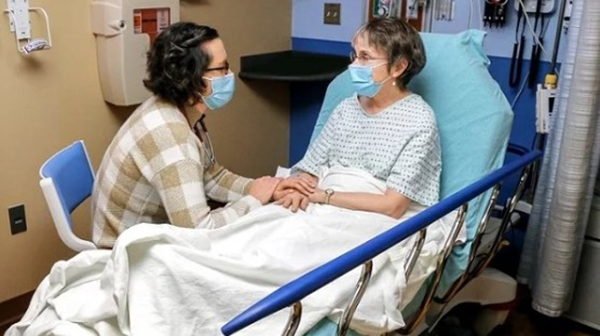The Miriam Hospital Launches Palliative Care Program in the Emergency Department
 An emergency department (ED) visit can be the most vulnerable time of a person’s life. In a new and specialized role with The Miriam Hospital’s emergency department, Leah McDonald, MD, alleviates the stress for many by simply talking with them.
An emergency department (ED) visit can be the most vulnerable time of a person’s life. In a new and specialized role with The Miriam Hospital’s emergency department, Leah McDonald, MD, alleviates the stress for many by simply talking with them.
A palliative care physician, Dr. McDonald is one of a large team of hospice and palliative physicians and nurse practitioners with HopeHealth, Lifespan's exclusive partner for inpatient hospice and palliative care. She and her team are leading a pilot program that makes The Miriam the only hospital in Rhode Island to provide palliative care in the emergency department. This approach to critical care translates into fewer extended hospital stays for patients, greater personalized patient care, and better quality of life for patients – of all ages – with grave, or life-limiting and vulnerable conditions.
“With the support of Dr. McDonald and her team, we are able to intervene sooner to bring palliative care to patients who need it,” said Mark Deitch, MD, senior vice president of medical affairs and chief medical officer, The Miriam. “By assessing the patient’s potential for palliative care at the time of their emergency visit, we can get patients the relief they need, avoid any unnecessary treatments, and reduce the time the patient and their family spends in the emergency room.”
For some patients, this intervention amidst the busy activity of the emergency department can eliminate an unnecessary stay in the hospital or additional invasive and costly testing. Patients with conditions that are manageable can return to the comfort and privacy of their own home where they will have the support of a palliative care or hospice team. Others are admitted for inpatient care that has been deemed necessary.
Discussions about palliative care with patients that occur early during their ED visit have been associated with a significantly shorter length of stay and lower cost of care for those patients admitted to the hospital. In Dr. McDonald’s experience, she has seen the impact of her conversations with patients. “They feel they’ve been communicated with,” she reflected. “We’ve listened to their wishes and needs.”